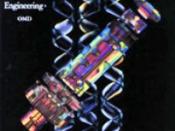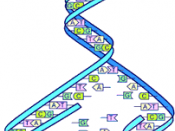What would you do if you were given the power to change your genetic code from brown hair to blond? Well, now you can do that thanks to the Human Genome Project. It is a source of hope to many people around the world but like everything else good, it also has its disadvantages.
With all the information that the Human Genome Project has provided, genetic engineering advanced and has made a huge jump forward. Very soon scientist will be able to genetically pre-determine nearly every characteristic newborn children are likely to have. Doctors will be able to determine how tall a child will be, what type of body they will have, what illnesses they will be resistant to, and even their IQ and personality. The possibilities are virtually endless but with them arises the issue of genetic discrimination. Genetic segregation will become more and more prevalent as society continues to strive toward perfection, and new methods of obtaining this are developed.
Since these processes are quite expensive, there is the possibility that only the currently elite class of citizens would be able to afford these alterations. This would create a split between genetically enhanced humans and those who still retain their unaltered genes.
True, our children will be smarter and healthier, but then what happens to the "God Childs". As geneticist Karl A. Drlica said, "What we now call an average child may eventually be considered defective" ("The Ethics of Genetic Engineering", Lisa Yount). Also, if employers were given access to the genetic history of potential employees, they might they be hesitant to hire a candidate that has not been altered, only because they would then have to pay more for health care.
Just like in any debate, there are two sides to the argument on the Human Genome Project. Albert Einstein once said, "Technological progress is like an axe in the hands of a pathological criminal." Any beneficial tool will have its side effects. Have we gone too far? Maybe. I believe that wanting a better life for our children isn't wrong and in fact, it is quite normal. Why let someone suffer from a disease when they have the option not to. All the technology and information that we have developed in previous years could greatly benefit our society but only if we use it wisely for the greater good of mankind not for the good of a single person.
References:
Yount, Lisa (2001). "The Ethics of Genetic Engineering". Connecticut: Greenhaven Pr.
Collins, F.S. (1999). Shattuck Lecture - "Medical and Societal Consequences of the Human Genome Project". The New England Journal of Medicine, pages 28-37.
http://www.ornl.gov/sci/techresources/Human_Genome/home.shtml Retrieved December 1st, 2006
McGee, Glenn. "The Perfect Baby". New York, Rowman & Littlefield Publishers. Inc. 2000
Murray TH, Rothstein MA, Murray RF Jr. "The Human Genome Project and the Future of Health Care". Bloomington, Indiana University Press, 1996


